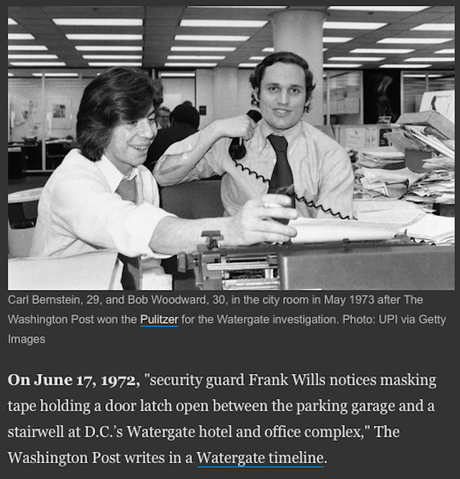 The following editorial is by the editorial board of The Washington Post:
The following editorial is by the editorial board of The Washington Post:Fifty years ago Friday, burglars broke into the Watergate complex — and the rest is more than just history. The scandal that ended in President Richard M. Nixon’s resignation from office helped shape our modern politics, reforming the government, revitalizing the press and redefining the parties. Now, the country confronts another generation-defining crisis, and events half a century old feel as relevant as if they happened yesterday.
The Nixon White House’s illegal sabotage of its opponents and the coverup that followed were examples of government going wrong. What happened after these crimes showed government going almost exactly right: Congress investigated, the news media reported, the people read, watched, listened and spoke — and eventually, enough members of the Republican elite put country over party to lead to the departure of a corrupt, dangerous president.
Today, Congress is investigating again: A select committee in the House of Representatives is examining what happened on Jan. 6, 2021, when an armed mob stormed the U.S. Capitol seeking to overturn the results of a lawful election — in part because a president, Donald Trump, exhorted them to. Yet most members of the GOP appear afraid to utter a word against the ex-president, who continues to hold their party in his grip. Worse still, most refuse to engage at all in this truth-seeking effort, or even to put much stock in the concept of truth itself. Not only do the two sides today share little when it comes to policy or philosophy. In many cases, they don’t even share a reality.
So in 2022, as Congress tries to get to the facts when facts have gone out of fashion, is there anything to be learned from 1972? Scandals happened in the decades before, from the Red Scare, to the Bay of Pigsinvasion, to the misguided decisions that mired the nation in the Vietnam War; scandals happened in the years after, from the Iran-contra affair, to the claims that there were weapons of mass destruction in Iraq, to the mental and physical torment of prisoners during the war on terrorism. All surely contributed to the erosion of trust in government to its depressing low of 20-some percent today.
Yet Watergate shook the nation as little else before and changed it — in some ways for better, by encouraging the press to hold government to account and the public to pay attention, as well as by ushering in legislation that served the same goals in areas such as campaign finance and intelligence, and in some ways for worse, by planting the seed of anti-government sentiment that has since grown like a strangling weed.
Jan. 6 has shaken the nation, too. The environment for needed change — whether updates to the Electoral Count Act and safeguards for voting rights, or a broader attempt by both parties to reconcile over common causes such as democracy and the rule of law — looks, admittedly, hostile. But enough people — from those in the chambers of Congress to those in any spot in the country near a television set or a newsroom desk — cared 50 years ago to make government work again when it appeared to have broken. The worst mistake anyone can make today is to give up on it because it has broken again.

